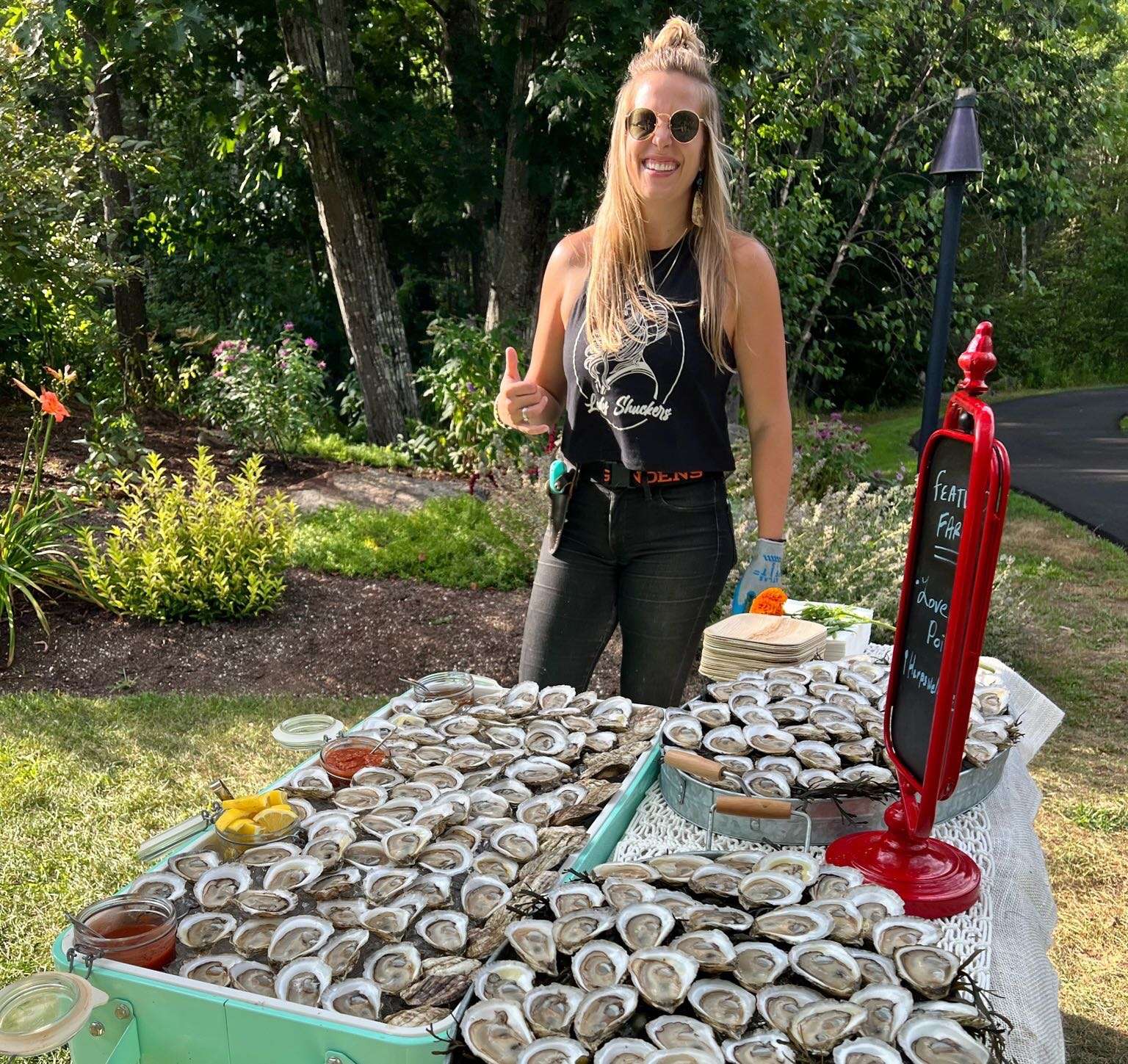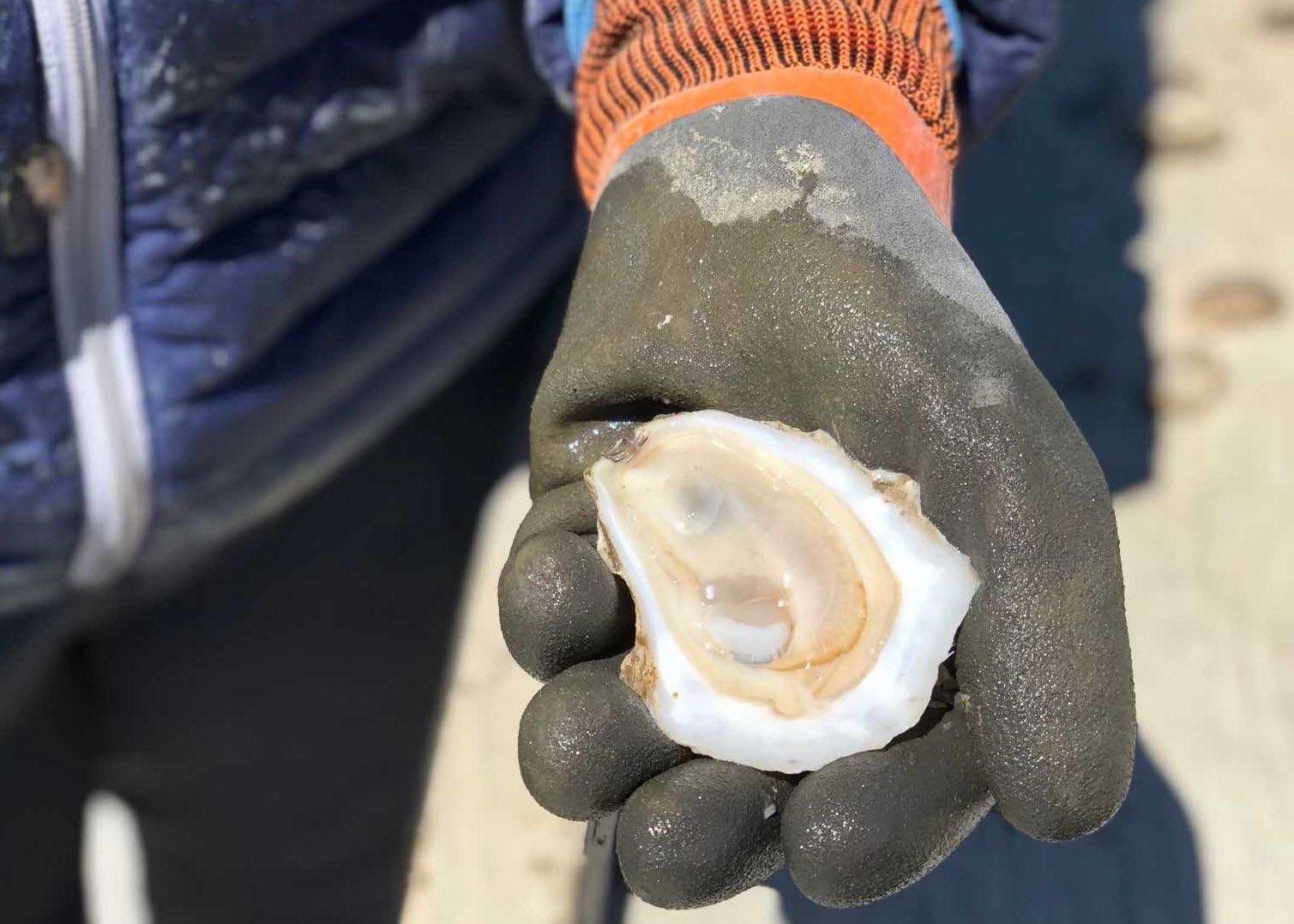
Processing Your Payment
Please do not leave this page until complete. This can take a few moments.
Oyster firm Lady Shuckers looks for creative ways 'to get products to the people'
 Courtesy / Lady Shuckers
Libby Davis, owner of Lady Shuckers, is seen here at the Cape Small Oyster Farm in Casco Bay.
Courtesy / Lady Shuckers
Libby Davis, owner of Lady Shuckers, is seen here at the Cape Small Oyster Farm in Casco Bay.
Libby Davis started Lady Shuckers, a mobile raw bar and event catering company in Portland, in the summer of 2021 as a part-time project.
By 2022, it was a full-time enterprise. Today, Davis sources from over 15 women-owned sea farms along the coastline, with a growing line-up of events and catering clients throughout Maine.
The company has a mission of sourcing from sea farms owned by women and creating visibility for underrepresented groups on and off the water such as LGBTQ+, BIPOC, people with disabilities and people in recovery and partners with aligned businesses, organizations and clients to amplify its impact.
The company provides private catering services at special events such as weddings, sailboat cruises, corporate outings, parties and graduations, and offers custom packages and ticketed educational events that highlight the importance of sustainable aquaculture through panel discussions, learn-to-shuck classes and mobile pop-ups with its food trailer.
We asked Davis about her startup, mission and growth plans. Here’s an edited transcript.
Mainebiz: What’s your background and how did you get into this?
Libby Davis: I was born and raised in Scarborough and studied biology at an environmental liberal arts school in Vermont that was very sustainability-oriented. After graduation, I went into the Peace Corps, where I spent three years in Madagascar, doing service work with farmers in the agricultural and the food security sector. I also did a lot of work with fuel-efficient cook stoves and became intrigued by the synergy of projects that increased social good for both human and environmental health.
I came back to Maine in 2018 but didn’t exactly know what I wanted to do after such a transformative experience. I met John Herrigel, owner of Maine Oyster Co. [in Portland] in 2018 and we co-managed the raw bar for 2½ years. He was my first mentor in the industry and started teaching me about oysters and taking me out on his oyster farm. I learned about their positive nutritional health benefits and how they are a sustainable source of protein.
MB: How did you get started?
LD: I was the general manager at John’s restaurant and met a lot of really inspiring people behind that bar. I also noticed oyster farming to be quite heavily male-dominated at that time. There were several prominent women who became my role models — Emily Sellinger of Emily’s Oysters, Amanda Moeser of Lanes Island and Krista Tripp of Aphrodite Oysters — and I wanted to support them. I started asking myself, 'What does the industry need to build this supply chain into a broader audience and marketplace?' That went alongside the larger goal: 'How do we get these world-class products outside of Maine to further advance the Maine seafood brand and to give more money to our growers?' Wheels were turning then the pandemic hit and restaurants closed. I wanted to start a farm, but farmers needed more creative ways to get their products to the people. So, I hatched a plan for a mobile oyster company specializing in events to educate people about how oysters are grown and telling the stories of the producers who make it possible.
MB: How did you get from Maine Oyster Co. to buying a mobile unit?
LD: I left Maine Oyster Co. in 2020 and took a corporate job back in international development that was based in Maine and was working from home. My business partner at the time and I had pitched the concept to Maine Sea Grant for a $14,000 grant as seed money to start the business. I left my corporate job and we used half of the grant to pay for a food trailer, which we were hoping to have for our first season. We got scammed and the seller never produced the trailer.
Even though we didn’t have the trailer, our first partnership was with Feel Good Portland, which hired us to do the raw bar on the [Portland-based charter and day sail schooner] Frances for their beer and oyster sunset cruises. People loved it and it felt like I had found my purpose. I started doing pop-ups that fall and winter throughout 2021 to gain more traction for the brand.
By spring of 2022, a family member loaned me some money for the food trailer I have now. It’s an 8-foot-by-12-foot cargo trailer with a large service window, built out with sinks and a live-action shucking area. I haul it with my truck, then unhitch and set it up for the day and co-market on social media with the industry partners we’re working with. We have also begun to book many private events.
MB: Did you know how to run a business?
LD: I had no clue how to run a business when I started. I had to figure a lot out on the fly and definitely made mistakes.
MB: How have you been marketing the business?
LD: Through our website, social media and word of mouth.
MB: How have you been financing your growth?
LD: Every penny I’ve made from the business has gone back into operating costs. I’m still working to get the business financially sustainable enough for me to have a salary. My largest expenses have included purchasing my former business partner's half of the company, installments to pay back the trailer, oysters, licenses and training people. When we’re out there, it’s not just the Lady Shuckers name we’re representing, but the farmers we work with, too. The training is important to make sure folks can execute effectively and give our clients the best experiential raw-bar events possible.
MB: How many events do you have on the books so far for 2023?
LD: Right now, I have about 50 food truck events and about 30 catering gigs. It’s shaping up to be a busy second season. We’ll be at Belleflower Brewing every Sunday in May, as well as Citrus Portland for Friday happy hours, and Apres and Austin Street.
MB: Do you have employees?
LD: I have a part-time roster of shuckers but the business really needs a full-time operations manager. The good news is that I have a full-time marketing and events intern coming through Educate Maine’s workforce development program this summer.

MB: How many oysters do you buy?
LD: We’re still small, in my opinion, but in 2022 — my first year — I bought about 80,000 oysters from women-owned farms from the 15 different sources that I rotate, in quantities of 200 to 400 oysters at a time.

MB: Do you buy other farmed seafood?
LD: We’re expanding our food trailer menu and started getting Kelp-Chi — a sugar kelp kimchi product — from Atlantic Sea Farms. We’re adding fried oyster po’gal sandwiches, Sea-Chi grilled cheese sandwiches, Maine Coast Fishermen’s Association’s monkfish stew and caviar bumps to mobile unit pop-ups this summer.
MB: How is the presence of women-owned oyster farms evolving?
LD: It’s an important part of growing this industry. There are over 150 oyster farms in Maine and only about 15% are owned and operated by women. That number continues to increase every year, but it’s still a small percentage. I’d say 10 of those women-owned oyster farms came online only in the last two years, so I think we are seeing an increase in representation, which is good. Representation matters. It matters to me and it matters to other people. If someone can see a small piece of themselves in another person and get inspired and say, ‘If they’re doing it, why not me?' then the company is fulfilling its mission.










0 Comments